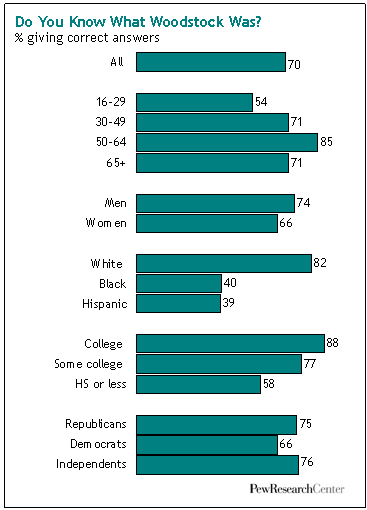“By the time we got to Woodstock, we were half a million strong, and everywhere there was song and celebration.” — Lyrics by Joni Mitchell; performed by Crosby, Stills, Nash and Young (and others)
Woodstock was a 1969 music festival in upstate New York that — more than any other single event — has come to symbolize the youth-driven social, cultural and political upheavals of the late 1960s. Through the years, it’s retained a foothold in the nation’s psyche and marketplace through a seemingly endless stream of movies, songs, albums, books, documentaries, reunions, memorabilia and merchandise.

But even with all that: 40 years later, how many people still know what Woodstock was?
Seven-in-ten do, according to the Pew Research survey of our nationally representative sample of 1,815 people ages 16 and above.
Not surprisingly, levels of public knowledge of Woodstock differ among different demographic groups. Moreover, the descriptions of Woodstock by today’s public show that, 40 years after the fact, it still packs a pretty good punch as a cultural Rorschach test.
Knowledge
The age group most familiar with Woodstock is adults ages 50 to 64. That’s not surprising; they are the baby boomers who came of age during the height of the youth rebellion of the 1960s. Today, 85% of them gave a correct answer to the following open-ended question in our survey: “This year marks the 40th anniversary of Woodstock. Can you tell me what Woodstock was, or don’t you know?”
Familiarity with Woodstock falls to 71% among two adjacent age groups: adults 30 to 49, and those 65 and older. Among the youngest age group in the survey (ages 16 to 24), just half know what Woodstock was.
The differences by race are even bigger. Some 82% of whites know what Woodstock was, more than double the share of blacks (40%) and Latinos (39%) in our survey who provided a correct answer. Likewise, those with college degrees (irrespective of race) are far more likely than those with a high school diploma or less to be able to identify Woodstock — 88% versus 58%.
Finally, a higher share of Republicans (75%) than Democrats (66%) know what Woodstock was, a disparity largely explained by the far higher share of blacks and Hispanics who are Democrats than Republicans.
Descriptions
Our open-ended question did not ask respondents for their opinion about Woodstock. It simply asked if they knew what it was. Nonetheless, respondents went ahead anyway and served up opinions aplenty.
Woodstock: The Rorschach Test
A sample of responses to the question: “Do you know what Woodstock was?”
Thumbs Down
- “A bunch of hippies met in a park and did whatever they wanted”
- “ A total moral mess”
- “Bunch of crazies running around smoking dope”
- “Hippie drug-fest”
- “ Wild kids having sex”
- “Filth”
- “Pathetic”
Thumbs Up
- “It was about love and peace and the war”
- “A celebration of freedom and new ideas”
- “People being out in the open and being free”
- “Era of rebellion and being yourself”
- “A celebration of life, love and music”
- “A love-in”
- “One hell of a party”
Maybe Up, Maybe Down
- “A mass gathering to hear music and run around in the mud”
- “Everyone went to a field and got naked”
- “An amorous party at a farm and Jimi Hendrix played ‘The Star-Spangled Banner’ on his guitar with his teeth”




